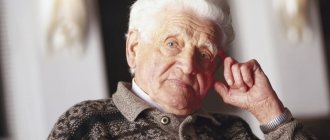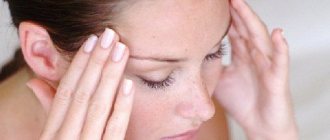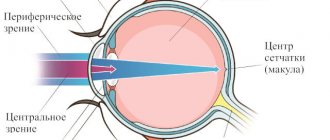From this article you will learn:
- How does dizziness manifest in an elderly person?
- What are the causes of dizziness in older people?
- What drugs can cause dizziness in an elderly person?
- How is dizziness treated in an elderly person?
- What to take for dizziness in an elderly person
Dizziness is a person’s feeling of disorientation in space. In medicine, the term “vertigo syndrome” is often used. Of course, dizziness occurs due to many reasons. Fatigue, hunger, tiredness and much more. If all these signs are absent, and there are no manifestations of external influences on the body, then dizziness may be a sign of serious illness.
Dizziness in older people is quite common. It is necessary to determine the cause of its occurrence and, if possible, eliminate it. Treatment for dizziness can take different approaches. Vertigo syndrome is treated with medications, traditional medicine recipes, and physiotherapy.
How does dizziness manifest in an elderly person?
When dizziness occurs, a person has the feeling that he himself is spinning in space, or space is spinning around him. The feelings that people with vertigo syndrome experience can range from drunkenness to nausea. At times, loss of consciousness occurs and falls are likely. There are other unpleasant moments.
Dizziness in older people is often both a sign of exposure to external factors and also means the presence of diseases inside the body. It is unlikely that there are people over the age of sixty who do not at least sometimes feel dizzy. If this happens periodically, it interferes with normal life activities. This condition simply needs to be corrected. For successful treatment of dizziness in older people, it is important to identify the causes of its development and origin.
- Recommended articles to read:
- Social services for older people
- Diseases of old age
- Valuable tips on how to choose a boarding house
What are the causes of dizziness in older people?
Dizziness in older people is a fairly common phenomenon that is directly related to age, vestibular disorders, neurological changes, vascular problems, and destruction of nerve cells. The main point here can be considered poor blood supply, ischemia and atherosclerosis.
Not only disturbances in the functioning of the vestibular apparatus lead to dizziness. Neurological diseases also lead to it, for example Parkinson's disease and other diseases of a neurotic nature. The influence of somatic ailments such as diabetes mellitus and cardiac arrhythmia is also possible.
Often, dizziness in older people is provoked by changes of an emotional and psychological nature. Limitations in their physical condition and transition to a different social status cause psychological maladaptation in them. If an elderly person suffers from phobias and other disorders of consciousness, this has an even more negative impact on the situation.
Most people whose vestibular apparatus does not work well feel the circular movement of objects in space. If the problem is serious, then there may be a disturbance in the perception of the outlines of objects that surround the person. This often happens with hypertensive patients. Along with these symptoms, the following may occur:
- spots in the eyes, feeling of blindness
- heaviness in the head
- faintness
- feeling of cottony limbs and apathy towards everything that is happening
If the manifestation of these signs is one-time in nature, then this can only indicate fatigue. Once you rest, the discomfort will disappear on its own.
But if these signs appear during menopause or after a stroke, then you should pay more attention to them. They can negatively affect human life. He begins to experience fear when an attack occurs, loses consciousness, and may fall and get injured. All this is unsafe for an elderly person.
If you have at least one of the above symptoms, go to the doctor. Don't waste time. Visit a therapist, neurologist and endocrinologist to determine the true cause of the disorders. This takes time because it is difficult to make a diagnosis right away. A thorough study of the central nervous system, collection of tests and the results of numerous examinations are required.
Exercises for vestibular vertigo
Dizziness often occurs when turning the head or body - this forces patients to try to avoid such movements. Gymnastics for patients with vestibular system disorders includes various types of exercises, including exercises with head and body turns. Exercises can be performed while sitting on a bed, with or without a pillow, sitting on a chair, or standing. The exercises are based on the principle of sensory mismatch between the movements of the eyes, torso and head. Special simulators that work on the principle of biofeedback will help increase the effectiveness of gymnastics. During the training period, you should avoid taking sedatives and alcohol.
What medications can cause dizziness in an older person?
The list of medications that have dizziness among their side effects can be endless. For example:
- analgesics (painkillers)
- cardiac
- normalizing blood pressure
- beta blockers
- diuretics
- antibiotics
- nonsteroidal anti-inflammatory drugs
- antidepressants, tranquilizers and sleeping pills
- anticonvulsants
Read material on the topic: Caring for disabled pensioners
Vestibular migraine
Why does it happen? According to one theory, during a migraine attack, changes in the activity of neurons in the cerebral cortex can reach the parietotemporal region, where the centers responsible for the sense of balance are located. According to another theory, during a migraine attack, biologically active substances are released in those areas of the brain stem that are related to the vestibular system.
How it manifests itself . An attack of rotational dizziness. In this case, there may not be a headache.
How to treat it. Antidepressants, anticonvulsants, beta-blockers.
Head spin! What herbs will help with dizziness Read more
How to provide first aid if an elderly person has severe dizziness
If an elderly person complains of dizziness, it is necessary to put him in bed and open the windows to ensure free access of oxygen. Take 8-10 drops of atropine (0.1%) and give it to the person to drink. To normalize the functioning of the nervous system in this situation, it is necessary to start taking tranquilizers.
The most important thing in treating the problem of dizziness is a correct diagnosis. Above, we gave recommendations on which specialists should be diagnosed.
Often the cause of dizziness in older people is changes in the functioning of the brain. If there are such suspicions, then additional research is necessary:
- Ultrasound of the brain;
- Electroencephalography;
- MRI of the brain.
Symptoms of dizziness
Dizziness is a subjective symptom. Patients describe their condition in different ways: as staggering when walking, loss of balance, a feeling of rocking, a feeling of slight intoxication, etc.
Attacks of dizziness are often accompanied by:
- headache;
- pre-fainting;
- ringing, noise in the ears;
- rapid heartbeat;
- pale skin;
- numbness of the limbs;
- hearing, gait, and vision impairments;
- general weakness.
Patient complaints are very important information for a doctor. Already at the initial appointment, an experienced specialist can guess the cause of dizziness based on the patient’s gestures and sensations, but a full examination is necessary to make an accurate diagnosis and develop a treatment plan.
Dizziness in an elderly person: treatment
Treatment of dizziness in older people is, first of all, determining the cause and choosing the right set of therapy. If the cause of dizziness lies in the vascular system of the brain, then treatment with drugs for atherosclerosis and ischemia is usually carried out. If the cause is a violation of the neural functions of the brain, then medications are prescribed that restore neural connections of the central nervous system.
Dizziness with high blood pressure is treated with a special group of medications, as well as traditional medicine recipes.
If you have dizziness, you should never self-medicate. Especially in old age. Strict compliance with the doctor’s instructions is the key to a successful solution to the problem.
Benign paroxysmal positional vertigo
Why does it happen? This type of vestibular vertigo is due to the fact that, for various reasons (as a result of injury, lack of vitamin D, prolonged bed rest), microscopic crystals - otoliths, located in one part of the vestibular analyzer, fall into another, thereby causing attacks of severe dizziness, provoked changing head position.
How it manifests itself. Unlike young and middle-aged people, in an elderly person, benign paroxysmal positional vertigo can only manifest itself in a feeling of instability and loss of balance when walking.
How to treat it. Using a special procedure, during which an experienced otoneurologist, changing the position of the patient’s head in a certain sequence, helps return the otoliths to their original place.
Article on the topic
If your head is spinning. Sudden loss of balance is a dangerous symptom
What medications are prescribed for dizziness in older people?
What medications for dizziness in older people are recommended by medicine?
The problem of dizziness in old age is very common. There is a class of drugs that reduce the number of dizziness attacks and have a beneficial effect on the brain. They are called nootropics. These include medications that speed up neural connections in the brain. They are prescribed for memory problems, mental impairment, senile sclerosis, and dementia. Nootropics are often used for problems with blood circulation, chronic fatigue, insomnia, and depression.
Nootropics are not only safe to use, but also have extensive effects. They are prescribed even to children and completely healthy people whose work requires constant attention and concentration. Drugs in this group act differently, so it is better to consult a doctor rather than self-medicate. Here is a list of the main nootropic drugs:
- Glycine;
- Cinnarizine;
- Phenotropil;
- Piracetam;
- Bilobil;
Any representative of the group of nootropics is aimed at improving blood circulation in the brain, eliminating hypoxia, accelerating neural connections in the central nervous system, and strengthening the walls of brain vessels. Some have a sedative effect. These drugs have a good effect on cell metabolism and increase the movement of energy in it. As a result, you can observe an improvement in memory, an increase in the ability to perceive information and an easier learning process. Efficiency and mood increase, sleep normalizes. As a result, the dizziness goes away.
Let's look at some drugs from the group of nootropics in a little more detail:
- Piracetam . The most popular of nootropics. It may disturb sleep, so the drug is taken in the first half of the day.
- Vinpocetine . It has been used for a long time. Does not cause drowsiness. There are no side effects. Contraindicated for pregnant women.
- Cinnarizine . It is prescribed not only for nootropic therapy. Has antiallergic effect. Side effects: drowsiness, dry mouth, gastrointestinal disturbances.
- Glycine . Has no side effects. Very popular with students during sessions. It is based on gamma-aminobutyric acid - an essential element for metabolic processes in the brain, accelerating its work.
- Phenibut . It is also based on gamma-aminobutyric acid. As a side effect, drowsiness is possible after the first doses.
There are also nootropic drugs of plant origin . Here are a few of them:
- Vinpocetine . Created on the basis of Vinca minor. Normalizes brain function by increasing blood supply to ischemic areas by relaxing the walls of blood vessels. May lower blood pressure.
- Bilobil . Created based on the ginkgo biloba plant. Saturates the brain with oxygen, delivers glucose, and increases the resistance of blood vessels to oxygen deficiency. Normalizes memory, helps concentration and improves learning ability. Neutralizes numbness of the limbs.
Any medication for dizziness must be taken for at least three months. The effect of treatment is noticeable only a month after the start of treatment. The frequency of taking the drug depends on its dosage, usually from one to three times a day.
Read material on the topic: Vitamins for older people
Dizziness in the daily practice of a doctor
The problem of diagnosing and treating vestibular disorders is one of the most pressing in modern medicine, which is determined by the high incidence rate and insufficient effectiveness of existing treatment methods. Among the reasons for visiting doctors of various specialties, it is 3–4% and 10%, respectively, to otolaryngologists and neurologists [1]. In a survey of more than 20 thousand people aged 18 to 64 years, it was found that over the past month more than 20% have experienced dizziness, of which more than 30% have suffered from dizziness for more than 5 years [2]. The prevalence of dizziness in the population is about 25%, and among the elderly - 80% [3].
Dizziness is divided into vestibular and non-vestibular, otherwise it is interpreted as systemic or non-systemic. It is known that systemic dizziness is associated with irritation of certain areas of the vestibular analyzer and, depending on the level of damage, can be peripheral or central. Peripheral vestibular vertigo (vertigo) occurs when the sensory elements of the ampullary apparatus and vestibule, vestibular ganglion and nerve conductors of the brain stem are damaged. Central vestibular vertigo occurs when there is damage to the connection with the vestibular nuclei in the brain stem, disruption of connections with the cerebellum, medial longitudinal fasciculus, oculomotor nuclei and their own connections, disruption of the vestibulospinal and vestibuloreticular connections (tract), as well as connections with the cerebral cortex [4] .
The most common cases of systemic dizziness can be divided into three groups:
1) dizziness accompanied by hearing loss; 2) dizziness not accompanied by hearing loss; 3) dizziness with central neurological symptoms [5].
In the event of acute rotational vertigo, it is important to exclude life-threatening conditions - cerebral circulatory disorders in the vertebrobasilar arterial system, the symptoms of which vary and depend on which artery is occluded.
In patients with lesions in the inferior cerebellar artery, isolated rotational vertigo with fluctuating hearing loss and/or tinnitus, simulating an attack of Meniere's disease, may be observed 1–10 days before the development of cerebral infarction. Typically, dizziness during a stroke in the vertebrobasilar arterial system is combined with other neurological symptoms. However, a small lesion in the area of the cerebellar nodule or patch, the area of the exit of the VIII nerve root between the pons and the medulla oblongata, and/or the vestibular nuclei can cause isolated vertigo without accompanying manifestations. Less commonly, such symptoms can occur with damage to the dorsal insular cortex of the flocculus, and in the latter case, gaze-induced nystagmus develops [6].
The most common signs of central damage to the vestibular system are: 1) vertical nystagmus; 2) nystagmus, changing direction; 3) atypical nystagmus (especially downward) in the head shaking test; 4) asymmetric oculomotor dysfunction; 5) severe postural instability with falls. Most of these symptoms have high specificity but low sensitivity [7].
One of the tools for the differential diagnosis of central and peripheral vertigo is the Halmagi test (head impulse test) and the head shaking test, identifying vertical squint deviation (skew deviation), not associated with damage to the oculomotor nerves or their nuclei [8].
The combination of a negative Halmagi test, vertical strabismus (skew deviation), changing the direction of nystagmus and a violation of smooth vertical tracking allows us to diagnose cerebrovascular accidents in the brain stem with 100% sensitivity and 90% specificity. The head rotation test is significant for lesions in the posterior cerebellar artery basin, but has limitations and can be positive in case of blockage of the anterior cerebellar artery with the formation of a focus in the cerebellar flocculus, vestibular nuclei or the exit zone of the VIII nerve [9–12].
According to various authors, indications for neuroimaging in patients with isolated rotational vertigo are:
1) old age; 2) the presence of risk factors for vascular diseases in combination with a normal head rotation test; 3) gaze-induced nystagmus, changing direction; 4) severe ataxia with falls; 5) a combination of acute dizziness with a first-time headache, especially of the occipital localization; 6) the presence of risk factors for vascular diseases in combination with acute hearing loss [13, 14].
Clinical example 1. Patient V., 42 years old. She went to the clinic with complaints of attacks of rotational dizziness lasting up to 2–3 hours, with a feeling of objects being displaced from right to left during an attack; occur suddenly, for no apparent reason. Before an attack of dizziness, there is a feeling of “fullness” in the left ear, which disappears soon after the dizziness stops. She reported three such attacks in total.
7 months ago I consulted a neurologist with complaints of moderate noise in the left ear and slight hearing loss, which arose suddenly, against the background of complete health. Pure-tone audiometry was performed - sensorineural hearing loss of the 1st degree. After the treatment (choline alfoscerate, B vitamin complex, deproteinized hemoderivative of calf blood), she noted a complete regression of the noise; audiometry control was not carried out.
On examination there are no neurological symptoms, vestibular function at rest is compensated. Magnetic resonance imaging of the cerebellopontine angles and internal auditory canals without pathological changes. Pure-tone audiometry - increasing hearing thresholds on the left at low frequencies up to 35 dB, with a conductive component.
Diagnosis: Meniere's disease, classic form.
When making a final diagnosis of Meniere's disease, one should adhere to the modern concept of "obvious" Meniere's disease:
1) two or more spontaneous attacks of systemic dizziness lasting from 20 minutes to 12 hours; 2) audiologically confirmed hearing loss (sensorineural) at low and medium frequencies during or after an attack of systemic vertigo; 3) fluctuating auditory symptoms: hearing, subjective noise, feeling of fullness in the ear; 4) absence of other causes of systemic dizziness [16].
Acute vestibular syndrome (vestibular neuronitis and labyrinthitis) is defined by a sudden attack of intense systemic dizziness. Depending on the level of damage, hearing loss and tinnitus may occur. As a rule, the onset of symptoms is preceded by a viral illness. With these diseases, dizziness begins gradually, intensifies over several hours, and then “mild” dizziness persists for the next few days or weeks. Dizziness persists at rest, but may subjectively intensify with changes in body position. Along with dizziness, nausea, vomiting, increased sweating, and pallor are present [17].
A labyrinthine fistula is characterized by an attack of systemic dizziness or oscillopsia that occurs due to a sharp strong sound, the Valsalva maneuver, or changes in pressure in the external auditory canal, but does not depend on changes in head position [18].
Clinical example 2. Patient M., 32 years old, complains of a constant feeling of slight instability, heaviness in the head, dizziness when throwing the head back, and sometimes wakes up at night from a pronounced sensation of rotation. 3 days ago he was discharged from the neurological department, where he was diagnosed with a transient ischemic attack in the vertebrobasilar arterial system. For the first time, an attack of dizziness occurred acutely in the morning when getting out of bed, and was accompanied by palpitations, weakness, vomiting, and cold sweat. He underwent a course of treatment with vascular and neurometabolic drugs with slight improvement.
There are no focal symptoms in the neurological status. The Disc-Hallpike test on the left is a geotropic nystagmus with a rotatory component lasting 40 seconds and a latent period of 5 seconds.
Diagnosis: benign paroxysmal positional vertigo on the left (canalolithiasis of the posterior semicircular canal). After performing the Epley maneuver twice, there was complete regression of symptoms.
Benign paroxysmal positional vertigo (BPPV)
Symptoms: the occurrence of systemic dizziness when changing the position of the head: turning in bed, throwing the head back or bending forward. The duration of the episode, as a rule, is no more than a minute.
The duration of the disease varies from several days to several years, but is more often calculated in days. BPPV occurs approximately twice as often in women. With a long course of the disease, patients report changing their lifestyle and their usual actions, so as not to provoke an attack of dizziness. Many people note an imbalance in the interictal period; a number of patients experience a feeling of heaviness in the head and nausea [16].
To diagnose this condition, special positional tests are performed: Dix–Hallpike for diagnosing BPPV of the posterior semicircular canal and McClure–Pagnini for diagnosing BPPV of the horizontal semicircular canal [18]. The diagnosis of BPPV is made with a positive Dix-Hallpike test. Nystagmus that occurs during the study has a latent period of 5–20 seconds (very rarely - up to 1 minute). Dizziness and nystagmus provoked during the test decrease gradually and stop within 60 seconds. Direction of nystagmus: towards the sore ear.
If the Dix-Hallpike test is negative, it is recommended to perform a test for the lateral (horizontal) semicircular canal of McClure-Pagnini [17].
One of the most common complaints in patients with migraine (9–14%) is dizziness. It can last from a few seconds to several days, and may not be accompanied by a headache [19].
Diagnosis criteria for vestibular migraine:
1) episodic vestibular symptoms; 2) migraine according to IHS (international headaches society) criteria; 3) at least two of the following migraine symptoms occurring during an attack of dizziness: migraine headache, photophobia, sound sensitivity, or visual or other aura; 4) other causes of vestibular vertigo are excluded [19].
In the rapid diagnosis of rotational vertigo, an internist can be helped by the scheme “Acute systemic vertigo (without other neurological symptoms)” (Fig.) [20].
Treatment of acute vestibular syndrome involves the use of antiemetics and vestibular suppressants. The action of the latter is aimed at reducing the asymmetry of vestibular tone and, thus, alleviating dizziness. However, their use is limited to a few days, since the drugs slow down the formation of compensatory mechanisms in acute peripheral damage to the vestibular apparatus. The main groups of drugs used for acute dizziness: anticholinergics, antihistamines, antidopaminergics and benzodiazepines.
From the anticholinergic group, centrally acting drugs are used that act on muscarinic receptors, improving movement tolerance. The most effective is scopolamine (M3 and M5 receptors), but the duration of its use is strictly limited due to the development of dependence. Side effects: dry mouth, mydriasis, accommodation paresis, sedation, decreased reaction speed.
Among the antihistamines, H1-blockers are used, such as diphenhydramine (Diphenhydramine), cyclizine (Valoid), dimenhydrinate (Dramina), meclozine (Bonin) and promethazine (Pipolfen). The mechanism of action is based on inhibition of activation of central cholinergic connections. Additionally, they have an anticholinergic and sedative effect. Compared to anticholinergic drugs, side effects in this group are less pronounced. It should be noted that newer drugs in this group without sedation do not penetrate the central nervous system (CNS), and are therefore useless in the treatment of dizziness.
Betahistine was registered as a drug in Europe in 1970; it is a synthetic drug that has the ability to bind to H1 histamine receptors, which are located in the neuroreceptor cells of the inner ear. It has a local powerful stimulating effect, increasing the release of neurotransmitters (histamine) from the nerve endings of the receptor cells of the inner ear into the synapse. Neurotransmitters act on the precapillary sphincters, causing vasodilation of the vessels of the inner ear, increasing their permeability and thereby normalizing intralabyrinthine pressure. In addition to affecting the receptors of the inner ear, betahistine affects the receptors of the vestibular nuclei located in the medulla oblongata, reducing activity and excitability, which helps to stop dizziness.
Dopamine antagonists are used to treat nausea and vomiting in patients with acute dizziness. The antiemetic effect is due to blocking dopamine receptors in the vomiting center of the brain stem. Some antihistamines (H1-blockers), such as promethazine, have additional dopamine-blocking effects.
The action of benzodiazepines is mediated by GABA, which is a neurotransmitter that inhibits vestibular function. The most commonly used drugs are diazepam, lorazepam, clonazepam and alprazolam [21].
For more than 50 years in world medical practice, doctors of various specialties have been using the complex antihomotoxic drug Vertigoheel for the treatment of dizziness [22].
Vertigohel is a multicomponent preparation containing the pharmacologically active ingredients Anamirta cocculus, Conium maculatum, Ambra grisea and Petroleum rectificatum. Numerous studies of the mechanism of action of the drug Vertigohel suggest multi-target activity in relation to vasodilation of capillaries and thereby microcirculation.
Numerous scientific studies, including randomized clinical trials, non-interventional studies (reproducing the scheme of daily work with patients) and meta-analysis, have confirmed the effectiveness of the clinical use of Vertigoheel.
A reference controlled cohort study on 774 patients was devoted to the effectiveness and tolerability of the drug Vertigohel in comparison with dimenhydrinate for dizziness of various origins. 25 patients were prescribed the drug Vertigohel (2-3 tablets 3 times a day) or dimenhydrinate (50 mg 2-3 times a day) for a course of no more than 8 weeks. Most patients had non-vestibular vertigo (visual/somatosensory or psychosomatic disorders). Presenting symptoms also included unsteadiness in gait and standing, with a tendency to fall. The second large group was represented by patients with vestibular (systemic) vertigo with manifestations of rotational vertigo, Meniere's disease or balance disorders.
The average number of attacks, their intensity and duration decreased significantly in both groups. By the end of the course of treatment, the patients also experienced relief from accompanying symptoms: nausea, vomiting, and increased sweating. The overall result of therapy was rated as “good” or “excellent” in 88% of cases in the Vertigohel group and in 87% of cases in the dimenhydrinate group. Tolerability was rated as “good” to “excellent” in 99% of cases in the Vertigohel group and in 98% of cases in the dimenhydrinate group [23].
In the period from 2009 to 2015, we observed 89 patients aged 18 to 42 years (53 women and 36 men) with peripheral vestibular vertigo, who were recommended to take 10 drops every 15 days when acute vestibular vertigo and nausea occurred. minutes (no more than 2 hours in a row) or dimenhydrinate 50–100 mg (if necessary, every 4 hours, but not more than 400 mg per day).
All patients received both drugs, but at different time intervals. The majority of patients (83 people - 93%) rated the high effectiveness of both drugs (as "good" or "excellent"), however, all patients (89 people - 100%) noted better tolerability of Vertigohel, since the lethargy and drowsiness characteristic of dimenhydrinate did not occur .
Thus, we can recommend the use of Vertigohel to patients to relieve acute vestibular crisis at home, since the drug is highly effective and is well tolerated. Thus, Vertigohel has no known interactions with other drugs, which is especially important for the treatment of elderly patients with concomitant chronic diseases.
Literature
- Oosterveld WJ The efficacy of piracetam in vertigo. A double-blind study in patients with vertigo of central origin // Arzneimittelforschung. 2000. No. 30 (11). P. 1947–1949.
- Yardley L., Britton J., Lear S., Bird., Luxon L. Relationship between balance system function and agoraphobic avoidance // Behav. Res. Ther. 1998. Vol. 33, No. 4. P. 435–439.
- Bobrov LS, Shmyrev VI, Vasil`ev AS, Morozov SP, Rudas MS 2011, No. 1 (39). S. 115–119.
- Sheremet A. S. Dizziness as a sign of damage to the vestibular analyzer // Consilium medicum. Vertigo app. 2001. pp. 3–9.
- Burton Martin J. Dizziness: features of diagnosis and treatment // Attending Physician. 1999. No. 4. pp. 58–60.
- Savitz SI, Caplan LR Vertebrobasilar disease // N Engl J Med. 2005; 352:2618–2626.
- Lee H. Isolated vascular vertigo // Journal of Stroke. 2014; 16 (3): 124–130.
- Brodsky MC Three dimensions of skew deviation // Br J Ophthalmol. 2003, Dec; 87(12):1440–1441.
- Newman-Toker DE, Kattah JC, Alvernia JE, Wang DZ Normal head impulse test differentiates acute cerebellar strokes from vestibular neuritis // Neurology. 2008; 70:2378–2385
- Cnyrim CD, Newman-Toker D., Karch C., Brandt T., Strupp M. Bedside differentiation of vestibular neuritis from central “vestibular pseudoneuritis” // J NeurolNeurosurg Psychiatry. 2008; 79:458–460.
- Kirchner H., Kremmyda O., Hufner K., Stephan T., Zingler V., Brandt T. et al. Clinical, electrophysiological, and MRI findings in patients with cerebellar ataxia and a bilaterally pathological head-impulse test // Ann NY AcadSci. 2011; 1233:127–138.
- Park HK, Kim JS, Strupp M., Zee DS Isolated floccular infarction: impaired vestibular responses to horizontal head impulse // J Neurol. 2013; 260:1576–1582.
- Lee H, Sohn SI, Cho YW, Lee SR, Ahn BH, Park BR et al. Cerebellar infarction presenting isolated vertigo: frequency and vascular topographical patterns // Neurology. 2006; 67:1178–1183.
- Kim HA, Lee H. Recent advances in central acute vestibular syndrome of a vascular cause // J Neurol Sci. 2012; 321: 17–22.
- Lopez-Escamez JA, Carey J., Chung W.-H., Goebel JA, Magnusson M., Mandalà M., Newman-Toker DE, Strupp M., Suzuki M., Trabalzini F., Bisdorff A. Diagnostic criteria for Meniere's disease. Consensus document of the Bárány Society, the Japan Society for Equilibrium Research, the European Academy of Otology and Neurotology (EAONO), the American Academy of Otolaryngology-Head and Neck Surgery (AAO-HNS) and the Korean Balance Society // Acta Otorrinolaringol Esp . 2021, Jan-Feb; 67(1), 1–7.
- Halmagyi GM Diagnosis and management of vertigo // Clinical Medicine. 2005; 5: 159–165.
- Bhattacharyya N., Baugh, RF, Orvidas L., Barrs D., Bronston LJ, DC, Cass S., Chalian AA, Desmond AL, Earll JM, Fife TD, Fuller DC, Judge JO, Mann NR, Rosenfeld RM, Schuring LT, Steiner RWP, Whitney SL, Haidar J. Clinical practice guideline: Benign paroxysmal positional vertigo // Otolaryngology–Head and Neck Surgery. 2008, 139, S47-S81.
- Huh Y.-E., Kim J.-S. Bedside Evaluation of Dizzy Patients // J Clin Neurol. 2013; 9:203–213.
- Boldingh MI, Ljøstad U., Mygland A., Monstad P. Comparison of Interictal Vestibular Function in Vestibular Migraine vs Migraine Without Vertigo // Headache: The Journal of Head and Face Pain. Vol. 53, Issue 7, p. 1123–1133.
- Vanni S., Pecci R. STANDING, a four-step bedside algorithm for differential diagnosis of acute vertigo in the Emergency Department // ACTA otorhinolaryngologica ita lica. 2014; 34:419–426.
- Singh RK, Singh M. Otorhinolaryngology Clibics // An International Journal. 2012; 4 (2): 81–85.
- Vertigoheel is the first choice drug for dizziness. Materials from the Heel company // Pharmacist. 2002, No. 20.
- Wolschner U., Strösser W., Weiser M., Klein P. Treating vertigo - combination remedy therapeutically equivalent to dimenhydrinate: results of a reference-controlled cohort study // Biol Med. 2001; 30: 184–190.
O. V. Zaitseva1, Candidate of Medical Sciences K. V. Overchenko, Candidate of Medical Sciences A. F. Khirnetkina
FSBI Scientific Center of Otorhinolaryngology FMBA of Russia, Moscow
1 Contact information
* The drug is not registered in the Russian Federation.
Dizziness in the elderly - treatment with folk remedies
Simple remedies:
- Red clover. 1 tsp dry flowers pour ½ cup boiling water. Insist. Drink the decoction twice a day, 50 ml 40 minutes before meals. Increases vital activity, cleanses the walls of blood vessels, eliminates dizziness in older people.
- Sage. 4 tbsp. sage flowers pour ½ liter of boiling water. Leave for 30 minutes. Drink before meals. Add some honey. Increases vital activity.
- Elecampane root. Finely chop, pour 1 pinch of boiling water. Leave for 30 minutes. Strain. Take equal parts 4 times a day. Gives strength, cleanses from parasites and infections. Stabilizes the vestibular apparatus and stops dizziness.
- Common parsley. Grind parsley seeds in a coffee grinder. 1 tsp Pour the powder into a glass of boiling water overnight. Strain in the morning. Take in equal parts 4 times a day before meals. Stops dizziness.
- Simple kelp (sea kale). 1 tsp Eat dried seaweed and drink water once a day. Increases immunity, removes toxins, normalizes the functioning of the central nervous system, and eliminates dizziness.
- A mixture of lemon balm leaves, peppermint, mistletoe and linden flowers. Pour boiling water over and leave. This infusion is good for poor functioning of the vestibular apparatus.
- Onion. Grind the onion in a meat grinder. If you breathe in the vapors of onion pulp, the dizziness will go away. Fill ½ glass jar with chopped onion. Add honey, filling the jar, stir. Place in the refrigerator for five days. Take 2 tbsp daily. in the morning before meals. Will give strength and eliminate severe dizziness. You can also rub onion on your temples if you feel dizzy.
- Veronica grass. Pour 1 tbsp into a thermos. dry veronica grass. Pour 250 ml of boiling water. Let it brew. Take 80-100 ml warm before meals. Relieves nervous excitement, eliminates dizziness.
- Hawthorn (flowers). 5 tbsp. pour 1 liter of hawthorn flowers. boiling water Leave for an hour. Add honey. Drink instead of tea. Helps with dizziness that occurs due to a diseased heart and blood vessels.
Tinctures:
- Garlic tincture. Grind 300 gr. garlic, put in a glass container, pour in ½ liter of alcohol. Place in a cool place for 15 days. Take with milk: 20 drops per half glass of milk. Removes toxins, eliminates infections, normalizes heart function. Eliminates dizziness.
- Hawthorn tincture. 150 gr. hawthorn buds, 50 gr. linden honey and 0.7 liters of cognac. Add 1 gr. cinnamon and vanilla. Leave for several days. Take 1 tbsp. in 10 minutes before meals. Normalizes heart function, improves the condition of blood vessels, and eliminates dizziness.
- Chestnut tincture. Grind the chestnut buds. 2 tbsp. l. raw materials pour ½ liter of Cahors heated to 70 degrees. Keep in a water bath for 15 minutes. Cool. Add 2 tbsp. l. honey and a little vanilla. Take 50 ml before meals. Normalizes the general condition, stimulates the functioning of brain vessels.
Socalation:
- Carrot juice. Take 0.5-1 glass three times a day before meals. Increases immunity, eliminates dizziness.
- A mixture of carrot, red beet and pomegranate juices. Mix in proportion 3:2:2. Take 0.5-1 glass three times a day before meals. Improves the general condition of older people.
- Pineapple juice. Powerful antioxidant. Contains vitamins and minerals. Strengthens blood vessels, promotes rejuvenation. Helps with anemia and dizziness in older people.
- Juice of young zucchini (you can add carrot juice to it). If the cause of dizziness is high blood pressure or lack of cardiac activity, take this juice.
- Juice from salad. If the cause of dizziness is a disruption of the central nervous system or a lack of cardiac activity, take 25 ml of juice four times a day.
Tablets for vestibular vertigo
Drugs for vestibular vertigo are Betaserc, Betagistin, Tagista, Vestibo, as well as drugs that support the endocrine system, the heart, and reduce blood pressure. Betaserc improves blood circulation in the brain and promotes the functioning of the vestibular apparatus. Betahistine is often used in complex treatment; it helps with nausea and vomiting. Tagista improves blood circulation in the brain and reduces lymph pressure in the labyrinth of the inner ear. A stable effect is achieved after a month of treatment. Vestibo improves blood circulation in the inner ear and brain; the drug is used in complex therapy.
Dizziness in the elderly: non-drug treatment
A good result in the treatment of dizziness in the elderly is achieved by combining therapy with medications, traditional medicine and, in addition, methods such as:
- Exercise therapy. Simple, properly selected physical therapy exercises improve overall well-being and have a good effect on the spine, and therefore on the functioning of blood vessels. Sometimes constant training gives better results than drug treatment.
- Reflexology (eg acupuncture). Acupuncture has a beneficial effect on the central nervous system, relaxes the muscle frame, and improves blood circulation.
- Physiotherapy. There are many new technologies in the field of physiotherapy. They treat with water, light, sound, magnets, laser. All these procedures have a positive effect on the nervous system if taken regularly.
- Psychotherapy
Read material on the topic: Exercises for older people
Prevention of dizziness in old age
The sooner you start taking care of your health, the easier it will be to transition into the status of an elderly person. Proper nutrition, daily routine, physical activity, giving up bad habits - all this prolongs the life of the body’s normal functioning. It is better to prevent the onset of the disease than to treat it for a long time. Take care of your body and undergo regular examinations if your age is approaching sixty. Lead an active lifestyle, go for walks, maintain a positive attitude. Then such an ailment as dizziness in the elderly will definitely not threaten you!











